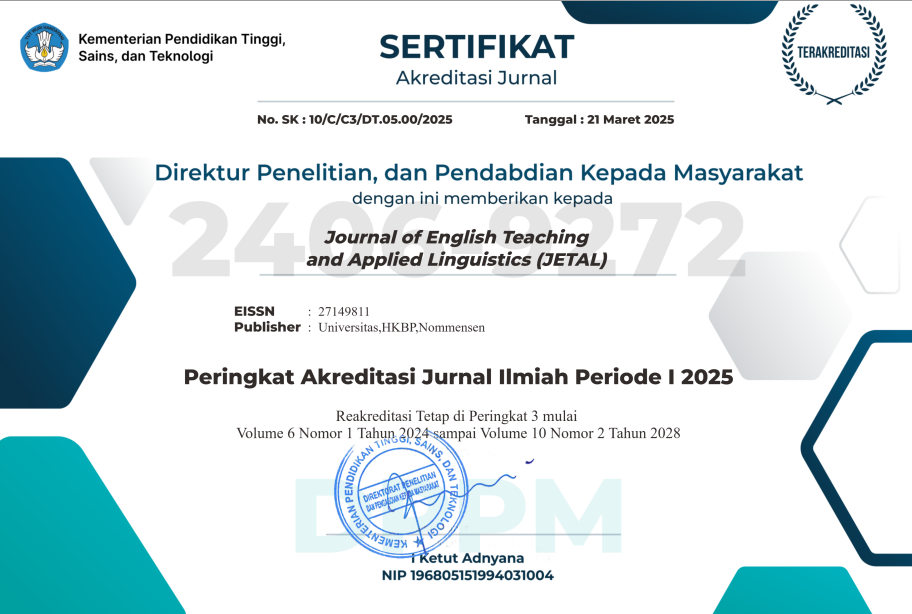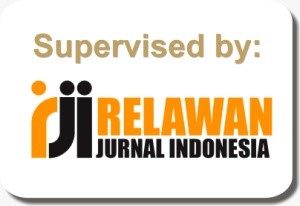The Analysis of Phononological Process on the Students' Pronunciation
Phonological process of Batak Learner's pronunciation
Abstract
ABSTRACT
The objectives of the study are; 1) the phonological process are dominantly used by the student of Batak Tribes on English Pronunciation.2)to find the problem existence of English version different from the Batak version. The researcher wants to reveal the reasons why the phonological problems exist in pronouncing English of the English students of Batak tribes and also to find out what way that the students will use to solve the phonological process problem in pronouncing English. There were 234 incorrect of pronouncing English as affricatives in 30,27 %, fricatives in 50,68% as the dominant problem and the vowel /e/and long vowel occurred in 19,05%. the students were sometimes not difficult to pronounce long vowels. There might be a reluctance of practicing the real pronunciation to EFL. Pedagogically, the students need to get studying much more than and the English Lecturers practice English twister repeatedly by using English Listening and tendency for consonants and vowels practices.
Keywords : Batak Tribes; Batak Tribes’ Pronunciation; Phonology of English Consonant and
vowels
References
Brown, G. 1997. Listening to Spoken English. London: Longman group, Ltd.
Cohen, Andrew D. 2012. Strategies: The Interface of Styles, Strategies, and Motivation on Tasks. Basingstoke. England: Palgrave MaanUian.
Corps, P. 1989. TEFL/TESL; Teaching English as a Foreign or Second Language. Washington: Information and Collection Exchange.
Dalton, C, and Seidlhofer, B. Pronunciation. 1994. Oxford: Oxford University Press.
Cunningham, M.P. 2000. Phonics they use ; words for reading and writing. USA : Longman.
Ellis, R. 1997. Second Language Acquisition. Oxford: Oxford University Press.
Finocchiaro, Mary. 1969. Teaching English as a second language. New York : Harper and Row publisher.
Fudge, C, E.(ed). 1973. Phonology.Victoria: Penguin Books Australia ltd, Ringwood.
Gimson, A. C. 1974. A Practical Course of English Pronunciation; a perceptual approach. London: University College London.
Hadi, S. 2004. Metodology Research. Yogyakarta: Andi
Hornby, A.S. 1987. Oxford Advanced Learners Dictionary of Current English. London : Oxford University Press.
McMahon, A. 2002. An Introduction to English Phonology. Edinburgh University Press Ltd
Marice. 2010. “Bahasa Batak Toba di Kota Medan: Kajian Interferensi dan Sikap Bahasa”. Disertasi. Medan: Pascasarjana USU
Nababan, P.W.J. 1988. Sosiolinguistik Suatu Penghantar. Jakarta: P.T Gramedia.
Nababan, P.W. J. 1981. A Grammar of Toba Batak. Acton: Dept. of Linguistics, Australian National University
Richards, J. J. 1974. Error Analysis. London: Longman Group Ltd.
Rea, L. M. ; and Parker, R. A. 1997. Designing and Conducting Survey Research, A Comprehensive guide. California: Jossey – Bass inc.
Sukrisno, Alim, Drs, MA. 2005. Exercise on Predicting the Seemingly Unpredictable Stress Patterns. Semarang. Rumah Indonesia
Wei, et al. (2002). Insights into English Pronunciation Problems of Thai Students. Reports Research (143):Thailand
Authors retain copyright and grant the journal right of first publication with the work simultaneously licensed under a Creative Commons Attribution-ShareAlike 4.0 International License (CC BY-SA 4.0) that allows others to share the work with an acknowledgment of the work's authorship and initial publication in this journal.
Authors are able to enter into separate, additional contractual arrangements for the non-exclusive distribution of the journal's published version of the work (e.g., post it to an institutional repository or publish it in a book), with an acknowledgment of its initial publication in this journal.
Authors are permitted and encouraged to post their work online (e.g., in institutional repositories or on their website) prior to and during the submission process, as it can lead to productive exchanges, as well as earlier and greater citation of published work (See The Effect of Open Access).






